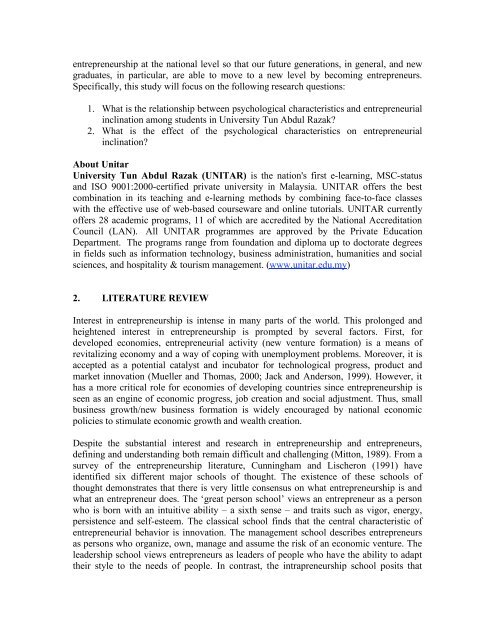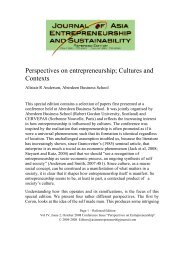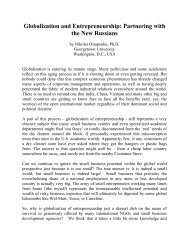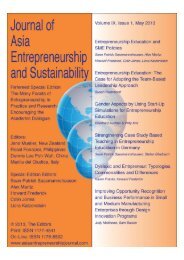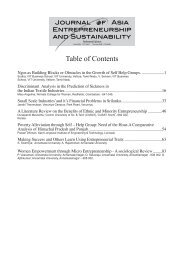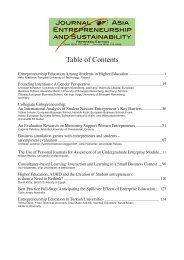Relationship between psychological characteristics - Journal of Asia ...
Relationship between psychological characteristics - Journal of Asia ...
Relationship between psychological characteristics - Journal of Asia ...
Create successful ePaper yourself
Turn your PDF publications into a flip-book with our unique Google optimized e-Paper software.
entrepreneurship at the national level so that our future generations, in general, and new<br />
graduates, in particular, are able to move to a new level by becoming entrepreneurs.<br />
Specifically, this study will focus on the following research questions:<br />
1. What is the relationship <strong>between</strong> <strong>psychological</strong> <strong>characteristics</strong> and entrepreneurial<br />
inclination among students in University Tun Abdul Razak?<br />
2. What is the effect <strong>of</strong> the <strong>psychological</strong> <strong>characteristics</strong> on entrepreneurial<br />
inclination?<br />
About Unitar<br />
University Tun Abdul Razak (UNITAR) is the nation's first e-learning, MSC-status<br />
and ISO 9001:2000-certified private university in Malaysia. UNITAR <strong>of</strong>fers the best<br />
combination in its teaching and e-learning methods by combining face-to-face classes<br />
with the effective use <strong>of</strong> web-based courseware and online tutorials. UNITAR currently<br />
<strong>of</strong>fers 28 academic programs, 11 <strong>of</strong> which are accredited by the National Accreditation<br />
Council (LAN). All UNITAR programmes are approved by the Private Education<br />
Department. The programs range from foundation and diploma up to doctorate degrees<br />
in fields such as information technology, business administration, humanities and social<br />
sciences, and hospitality & tourism management. (www.unitar.edu.my)<br />
2. LITERATURE REVIEW<br />
Interest in entrepreneurship is intense in many parts <strong>of</strong> the world. This prolonged and<br />
heightened interest in entrepreneurship is prompted by several factors. First, for<br />
developed economies, entrepreneurial activity (new venture formation) is a means <strong>of</strong><br />
revitalizing economy and a way <strong>of</strong> coping with unemployment problems. Moreover, it is<br />
accepted as a potential catalyst and incubator for technological progress, product and<br />
market innovation (Mueller and Thomas, 2000; Jack and Anderson, 1999). However, it<br />
has a more critical role for economies <strong>of</strong> developing countries since entrepreneurship is<br />
seen as an engine <strong>of</strong> economic progress, job creation and social adjustment. Thus, small<br />
business growth/new business formation is widely encouraged by national economic<br />
policies to stimulate economic growth and wealth creation.<br />
Despite the substantial interest and research in entrepreneurship and entrepreneurs,<br />
defining and understanding both remain difficult and challenging (Mitton, 1989). From a<br />
survey <strong>of</strong> the entrepreneurship literature, Cunningham and Lischeron (1991) have<br />
identified six different major schools <strong>of</strong> thought. The existence <strong>of</strong> these schools <strong>of</strong><br />
thought demonstrates that there is very little consensus on what entrepreneurship is and<br />
what an entrepreneur does. The ‘great person school’ views an entrepreneur as a person<br />
who is born with an intuitive ability – a sixth sense – and traits such as vigor, energy,<br />
persistence and self-esteem. The classical school finds that the central characteristic <strong>of</strong><br />
entrepreneurial behavior is innovation. The management school describes entrepreneurs<br />
as persons who organize, own, manage and assume the risk <strong>of</strong> an economic venture. The<br />
leadership school views entrepreneurs as leaders <strong>of</strong> people who have the ability to adapt<br />
their style to the needs <strong>of</strong> people. In contrast, the intrapreneurship school posits that


